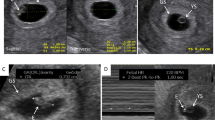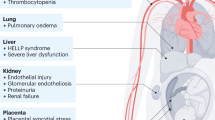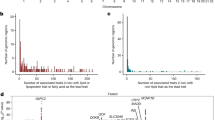Abstract
Objective:
Leptin signaling is important in the establishment of pregnancy. We sought to determine if single nucleotide polymorphisms (SNPs) in the leptin and leptin receptor genes are associated with idiopathic recurrent pregnancy loss (RPL).
Study Design:
We conducted a case-control study with cases defined as women with idiopathic RPL and controls as parous women without pregnancy losses. A total of 99 cases and 108 controls were genotyped for the leptin (−2548 G/A) SNP and the leptin receptor A223G SNP. Genotype and allele frequencies were compared between cases and controls using χ2 test.
Result:
In this population, there was no significant difference in the genotype or allele frequencies for the leptin (−2548 G/A) or leptin receptor A223G SNPs between women with idiopathic RPL and controls.
Conclusion:
Although leptin signaling is critical to many aspects of reproduction, the maternal leptin and leptin receptor SNPs evaluated in this study are unlikely to have a clinically meaningful role in RPL.
This is a preview of subscription content, access via your institution
Access options
Subscribe to this journal
Receive 12 print issues and online access
$259.00 per year
only $21.58 per issue
Buy this article
- Purchase on Springer Link
- Instant access to full article PDF
Prices may be subject to local taxes which are calculated during checkout
Similar content being viewed by others
References
Boklage CE . Survival probability of human conceptions from fertilization to term. Int J Fertil 1990; 35 (2)): 75, 9–80 1–94.
Simpson JL . Incidence and timing of pregnancy losses: relevance to evaluating safety of early prenatal diagnosis. Am J Med Genet 1990; 35 (2): 165–173.
Alberman ED, Creasy MR . Frequency of chromosomal abnormalities in miscarriages and perinatal deaths. J Med Genet 1977; 14 (5): 313–315.
Ben-Rafael Z, Seidman DS, Recabi K, Bider D, Mashiach S . Uterine anomalies. A retrospective, matched-control study. J Reprod Med 1991; 36 (10): 723–727.
Mills JL, Simpson JL, Driscoll SG, Jovanovic-Peterson L, Van Allen M, Aarons JH et al. Incidence of spontaneous abortion among normal women and insulin-dependent diabetic women whose pregnancies were identified within 21 days of conception. N Engl J Med 1988; 319 (25): 1617–1623.
Goldenberg RL, Thompson C . The infectious origins of stillbirth. Am J Obstet Gynecol 2003; 189 (3): 861–873.
Faussett MB, Branch DW . Autoimmunity and pregnancy loss. Semin Reprod Med 2000; 18 (4): 379–392.
Alonso A, Soto I, Urgelles MF, Corte JR, Rodriguez MJ, Pinto CR . Acquired and inherited thrombophilia in women with unexplained fetal losses. Am J Obstet Gynecol 2002; 187 (5): 1337–1342.
Stephenson MD . Frequency of factors associated with habitual abortion in 197 couples. Fertil Steril 1996; 66 (1): 24–29.
Moschos S, Chan JL, Mantzoros CS . Leptin and reproduction: a review. Fertil Steril 2002; 77 (3): 433–444.
Zhang Y, Proenca R, Maffei M, Barone M, Leopold L, Friedman JM . Positional cloning of the mouse obese gene and its human homologue. Nature 1994; 372 (6505): 425–432.
Chehab FF, Lim ME, Lu R . Correction of the sterility defect in homozygous obese female mice by treatment with the human recombinant leptin. Nat Genet 1996; 12 (3): 318–320.
Ramos MP, Rueda BR, Leavis PC, Gonzalez RR . Leptin serves as an upstream activator of an obligatory signaling cascade in the embryo-implantation process. Endocrinology 2005; 146 (2): 694–701.
Anifandis G, Koutselini E, Stefanidis I, Liakopoulos V, Leivaditis C, Mantzavinos T et al. Serum and follicular fluid leptin levels are correlated with human embryo quality. Reproduction 2005; 130 (6): 917–921.
Brannian JD, Schmidt SM, Kreger DO, Hansen KA . Baseline non-fasting serum leptin concentration to body mass index ratio is predictive of IVF outcomes. Hum Reprod 2001; 16 (9): 1819–1826.
Laird SM, Quinton ND, Anstie B, Li TC, Blakemore AI . Leptin and leptin-binding activity in women with recurrent miscarriage: correlation with pregnancy outcome. Hum Reprod 2001; 16 (9): 2008–2013.
Tommaselli GA, Di Spiezio Sardo A, Di Carlo C, Bifulco G, Cerrota G, Cirillo D et al. Do serum leptin levels have a role in the prediction of pregnancy outcome in case of threatened miscarriage? Clin Endocrinol (Oxf) 2006; 65 (6): 772–775.
Snoussi K, Strosberg AD, Bouaouina N, Ben Ahmed S, Helal AN, Chouchane L . Leptin and leptin receptor polymorphisms are associated with increased risk and poor prognosis of breast carcinoma. BMC Cancer 2006; 6: 38.
Yiannakouris N, Yannakoulia M, Melistas L, Chan JL, Klimis-Zacas D, Mantzoros CS . The Q223R polymorphism of the leptin receptor gene is significantly associated with obesity and predicts a small percentage of body weight and body composition variability. J Clin Endocrinol Metab 2001; 86 (9): 4434–4439.
Rigo J, Szendei G, Rosta K, Fekete A, Bogi K, Molvarec A et al. Leptin receptor gene polymorphisms in severely pre-eclamptic women. Gynecol Endocrinol 2006; 22 (9): 521–525.
Quinton ND, Lee AJ, Ross RJ, Eastell R, Blakemore AI . A single nucleotide polymorphism (SNP) in the leptin receptor is associated with BMI, fat mass and leptin levels in postmenopausal Caucasian women. Hum Genet 2001; 108 (3): 233–236.
Ribeiro R, Vasconcelos A, Costa S, Pinto D, Morais A, Oliveira J et al. Overexpressing leptin genetic polymorphism (-2548 G/A) is associated with susceptibility to prostate cancer and risk of advanced disease. Prostate 2004; 59 (3): 268–274.
Hoffstedt J, Eriksson P, Mottagui-Tabar S, Arner P . A polymorphism in the leptin promoter region (−2548G/A) influences gene expression and adipose tissue secretion of leptin. Horm Metab Res 2002; 34 (7): 355–359.
Cervero A, Horcajadas JA, MartIn J, Pellicer A, Simon C . The leptin system during human endometrial receptivity and preimplantation development. J Clin Endocrinol Metab 2004; 89 (5): 2442–2451.
Quinton ND, Laird SM, Okon MA, Li TC, Smith RF, Ross RJ et al. Serum leptin levels during the menstrual cycle of healthy fertile women. Br J Biomed Sci 1999; 56 (1): 16–19.
Masuzaki H, Ogawa Y, Sagawa N, Hosoda K, Matsumoto T, Mise H et al. Nonadipose tissue production of leptin: leptin as a novel placenta-derived hormone in humans. Nat Med 1997; 3 (9): 1029–1033.
Bischof P, Meisser A, Campana A . Mechanisms of endometrial control of trophoblast invasion. J Reprod Fertil Suppl 2000; 55: 65–71.
Sugathadasa B, Tennekoon K, Karunanayake E, Kumarasiri J, Wijesundere A . Association of −2548 G/A polymorphism in the leptin gene with preeclampsia/pregnancy-induced hypertension. Hypertens Pregnancy 2010; 29: 366–374.
McCarthy JF, Misra DN, Roberts JM . Maternal plasma leptin is increased in preeclampsia and positively correlates with fetal cord concentration. Am J Obstet Gynecol 1999; 180 (3 Pt 1): 731–736.
Ambrosini G, Nath AK, Sierra-Honigmann MR, Flores-Riveros J . Transcriptional activation of the human leptin gene in response to hypoxia. Involvement of hypoxia-inducible factor 1. J Biol Chem 2002; 277 (37): 34601–34609.
Wiedemann A, Vocke F, Fitzgerald JS, Markert UR, Jeschke U, Lohse P et al. Leptin gene (TTTC)(n) microsatellite polymorphism as well as leptin receptor R223Q and PPARgamma2 P12A substitutions are not associated with hypertensive disorders in pregnancy. Am J Reprod Immunol 2010; 63 (4): 310–317.
Flegal KM, Carroll MD, Ogden CL, Curtin LR . Prevalence and trends in obesity among US adults, 1999–2008. JAMA 2010; 303 (3): 235–241.
Kim SY, Dietz PM, England L, Morrow B, Callaghan WM . Trends in pre-pregnancy obesity in nine states, 1993-2003. Obesity (Silver Spring) 2007; 15 (4): 986–993.
Kroon B, Harrison K, Martin N, Wong B, Yazdani A . Miscarriage karyotype and its relationship with maternal body mass index, age, and mode of conception. Fertil Steril 2011; 95 (5): 1827–1829.
Landres IV, Milki AA, Lathi RB . Karyotype of miscarriages in relation to maternal weight. Hum Reprod 2010; 25 (5): 1123–1126.
Paracchini V, Pedotti P, Taioli E . Genetics of leptin and obesity: a HuGE review. Am J Epidemiol 2005; 162 (2): 101–114.
Bender N, Allemann N, Marek D, Vollenweider P, Waeber G, Mooser V et al. Association between variants of the leptin receptor gene (LEPR) and overweight: a systematic review and an analysis of the CoLaus study. PLoS One 2011; 6 (10): e26157.
Heuser C, Dalton J, Macpherson C, Branch DW, Porter TF, Silver RM . Idiopathic recurrent pregnancy loss recurs at similar gestational ages. Am J Obstet Gynecol 2010; 203 (4): 343 e1–343 e5.
Author information
Authors and Affiliations
Corresponding author
Ethics declarations
Competing interests
The authors declare no conflict of interest.
Additional information
Presented in poster format at the 31st Annual Meeting of the Society for Maternal-Fetal Medicine, San Francisco, CA, USA, February 2011.
Rights and permissions
About this article
Cite this article
Chin, J., Heuser, C., Eller, A. et al. Leptin and leptin receptor polymorphisms and recurrent pregnancy loss. J Perinatol 33, 589–592 (2013). https://doi.org/10.1038/jp.2013.25
Received:
Revised:
Accepted:
Published:
Issue Date:
DOI: https://doi.org/10.1038/jp.2013.25
Keywords
This article is cited by
-
Interleukin-17 and leptin genes polymorphisms and their levels in relation to recurrent pregnancy loss in Egyptian females
Immunogenetics (2015)
-
Association between apolipoprotein E gene polymorphism and the risk of recurrent pregnancy loss: A meta-analysis
Journal of Assisted Reproduction and Genetics (2013)



